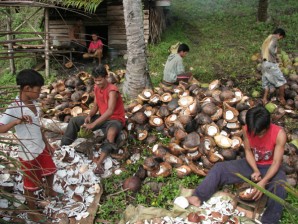Slow coconut recovery tests Marinduque farmers’ patience
Since Supertyphoon “Reming” ravaged their farms and nearly wiped out all of their coconut trees in 2006, Marinduque’s farmers believe that they are now in a worse situation.
Jaime Mandia, 49, a farmer from Barangay Balimbing in the capital town of Boac, says he can harvest only two to three sacks of copra, two times a year, for a measly income of P2,000. He moonlights as a carpenter to earn P150 per day.
A tenant of a 2-hectare coconut plantation, Mandia claims that he used to harvest 10 sacks of copra, eight to 10 times a year, and earn P1,000 to P1,500 per harvest or at least P8,000 per year.
Another farmer, Renato Villaruel, 55, of Barangay Lamesa in Santa Cruz town, tends a 2-ha coconut plantation, which once yielded 10 sacks of copra per harvest, eight times a year. He would earn P1,500 per harvest for a two-day work.
Today, his share is only P600 from each of the three harvests a year. He sells rice cakes daily to augment his earnings.
“I am having problems now on how I will be able to keep my children in school,” he says. Of his eight children, the eldest is already in college, three are in high school, and three are in elementary school.
Replanting
Mandia and Villaruel rue that what was supposed to be a five-year recovery period for trees damaged by Reming did not materialize. Banking on their 40 years’ experience as coconut farmers, they had expected full recovery in three to five years.
Teofila Ferrer Lingon, officer in charge of the Philippine Coconut Authority (PCA) in Marinduque, confirms the slow comeback, but blames farmers for not exerting enough effort to replant trees to speed up rehabilitation.
She says it will take another seven years for the damaged trees to fully recover. “Most of the trees are already old and less productive,” she says.
Of the 35,448 ha of coconut farms in Marinduque, 37 percent are planted with trees over 50 years old and needed to be replaced. The province has 19,000 coconut farmers.
Based on PCA records, total harvest of coconuts was a measly 11 metric tons last year. Total harvest for the last five years was way below the yearly average of 25 MT before Reming.
In peso value, the coconut harvests for 2011 was only less than P25 million, compared to the annual average of almost P320 million, based on eight harvests per year before 2006 and when prices of copra had been higher.
Compounding the woes of the farmers is the low price of copra, which is pegged at between P20 and P23 per kilogram.
Copra price has nose-dived from P62 per kg before Reming to as low as P15 in 2008. It slightly recovered to its present level, but the amount was way, way below the past figure.
Intercropping
The PCA has intensified its replanting and intercropping programs to somewhat ease the farmers’ financial burdens.
Lingon is dismayed, however, by the “lack of initiative and interest” of farmers to intercrop which could have provided extra income while the coconut trees were recovering.
She hopes the national government will include coconut replanting as a condition for recipients of its conditional cash transfer program to help alleviate poverty.
Lingon says the PCA has been encouraging the farmers to utilize the coconuts’ byproducts, including “coco-sugar.”
“The potential of coco-sugar production as an alternative source of income for the farmers is enormous. Coco-sugar retails at P150 per kg in Manila,” she says.















